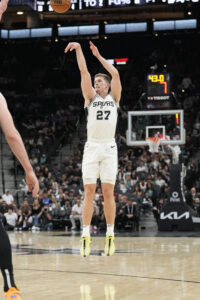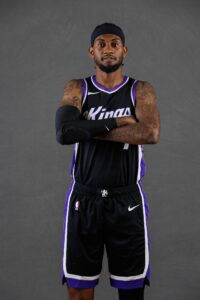No. 4 overall pick Stephon Castle said both before and after the draft that he views himself as a point guard, but his role heading into his rookie season is uncertain, writes Tom Orsborn of The San Antonio Express-News (subscription required). The Spurs signed Chris Paul in free agency and also have Tre Jones, who started most of the past two seasons at point. Third-year guards Malaki Branham and Blake Wesley have initiated the offense at times as well.
“I don’t really know, but it doesn’t really matter to me,” Castle said of how head coach Gregg Popovich plans to use him.
Whichever positions Castle is tasked with, he says he’s ready to contribute.
“I feel like just using my versatility to be on the court is the main thing,” said Castle. “Just going out there and not really giving myself any kind of expectations. Just kind of trying to play free. So, I feel like the biggest thing is being on the court so I can find a way to help us win. That’s a good enough role for me.”
Here’s more on the Spurs:
- Popovich claimed last week that he didn’t know who Riley Minix was when training camp opened, but the undrafted rookie forward has made a strong impression on the legendary coach, Orsborn adds. The Spurs recently converted Minix’s Exhibit 10 deal to a two-way contract. He says he didn’t do anything out of the ordinary to get Popovich’s attention. “Just staying confident, playing my game, doing whatever the team needed, being able to shoot the ball, make shots when I was open, just all the little things I have been doing all my life,” Minix said.
- Rookie of the Year. Runner-up for Defensive Player of the Year. All-Defensive First Team. Silver medal. Big man Victor Wembanyama accomplished all of those things in his first year-plus after being selected No. 1 overall in 2023. While he doesn’t take those accolades for granted, Wembanyama says he has much more he wants to accomplish, according to Tim Reynolds of The Associated Press. “It’s the same for all of my trophies, team trophies or even individual,” Wembanyama said. “I love them. I really cherish them. But I want all my trophies that I get right now to be bricks to build something great in the future. You know, one brick by itself is not much. You can get a palace when you accumulate them.”
- In case you missed it, guards Malachi Flynn, Brandon Boston and Jamaree Bouyea — all of whom were on Exhibit 10 deals for training camp — were released on Saturday to finalize San Antonio’s regular season roster. Boston was subsequently claimed by the Pelicans on Monday.

 As outlined below, the deal sent McDaniels, cash, and the Kings’ unprotected 2031 second-round pick to San Antonio in exchange for the Bulls’ top-55 protected 2025 second-round pick. Sacramento also created a $4.74MM trade exception.
As outlined below, the deal sent McDaniels, cash, and the Kings’ unprotected 2031 second-round pick to San Antonio in exchange for the Bulls’ top-55 protected 2025 second-round pick. Sacramento also created a $4.74MM trade exception.